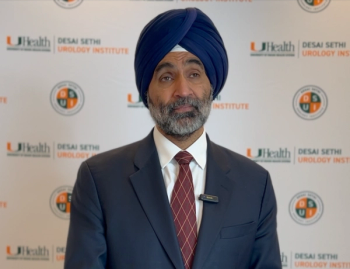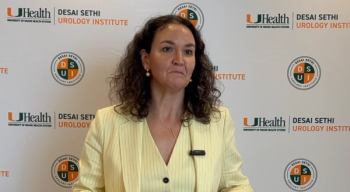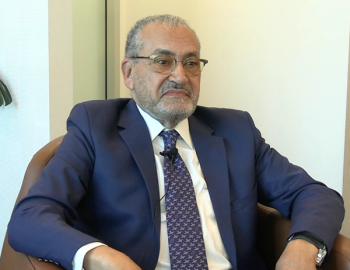
OAB and Incontinence
Latest News
Latest Videos

CME Content
More News

Overall, 85% of respondents indicated they experienced frequent bladder leaks.

"My second book is on pelvic pain or prostatitis. It is focused on a holistic approach and stretches and mindfulness exercises," says Vanita Gaglani, RPT.

At 24 months, 79% of patients experienced a response to therapy, and 56% achieved at least a 75% reduction in UUI episodes.

"It was interesting to think about the relationship between a disease process and a person's environment, and measure that and establish that relationship in a quantitative way," says William Furuyama, MD.

"Most of these comorbidities, while they do affect the bladder, don't seem to affect the surgeries for stress urinary incontinence," says Jaspreet S. Sandhu, MD.

"There are actually no data to support that 1 neuromodulation is better than another based on disease severity, and this is based on the systematic review done for the OAB guideline," says Anne Pelletier Cameron, MD, FRCSC, FPMRS.

"I use a multi-pronged approach. I focus on behavior modification, nutrition, hydration, and exercise," says Vanita Gaglani, RPT.

"I know this year we're going to see even more companies producing more products, more results, and hopefully really help change and improve patient outcomes, especially when it comes to overactive bladder," says Raveen Syan, MD, FPMRS.

"If you can do this surgery well, patients actually go back to living a normal life, and they're immensely, immensely happy," says Jaspreet S. Sandhu, MD.

Functional success was achieved in 58% of patients at 5-year follow-up.

"There is new technology emerging for skin stimulation of the perineum that is just recently evolving to help control OAB symptoms," says Anne Pelletier Cameron, MD, FRCSC, FPMRS.

Sunobinop resulted in a reduction in urinary urgency, urinary frequency, and incontinence episodes over the treatment period compared with placebo.

The approval of vibegron is supported by data from the phase 3 COURAGE trial.

"I think this is a very important trial, just to bring some importance about patients' worries about being sexually active with urinary incontinence," says LeRoy Jones, MD.

The primary aims for the EVANESCE-II trial are to confirm the safety of the FemPulse System and to establish noninferiority to first-line tolterodine.

"I think that now we have good data that patient-reported outcomes have to be considered in these patient populations," says Andrew C. Peterson, MD, MPH.

"I think what we definitively have is a device that's been around for over 50 years now that now we know significantly improves quality of life," says Andrew C. Peterson, MD, MPH.

"We were really surprised that we found that the anxiety components in the depression questions in those 3 questionnaires really improved drastically when we compared them to pretreatment vs post treatment," says Andrew C. Peterson, MD, MPH.

The UUI responder rate was 71.8% among those who received SNM and 71.3% among those who received iTNM.

“Over 80% of the patients are greater than 50% improved, and 50% [had] over [a] 75% reduction in UUI episodes,” says Cindy L. Amundsen, MD.

The therapeutic response rate was 79% at 24 months, which is comparable to the rates seen at 6 months (78%) and 12 months (82%).

At 1 month, the mean decrease in the OAB-Q symptom severity subscale score was -31.2 in the 1-injection cohort vs -39.5 in the 10-injection cohort.

Over 12 weeks, the average reduction in total UI frequency was 2.3 episodes per day among those in the pelvic yoga program compared with 1.9 episodes per day among those in the general physical conditioning program.

Data from a real-world evidence study of the Leva System were recently published in JMIR Formative Research, supporting the safety and effectiveness of the program in the treatment of patients with urinary incontinence.

"If we want to do a targeted therapy, we have to know exactly where and what we are treating," says Gamal M. Ghoniem, MD, FACS, ABU/FPMRS.
















